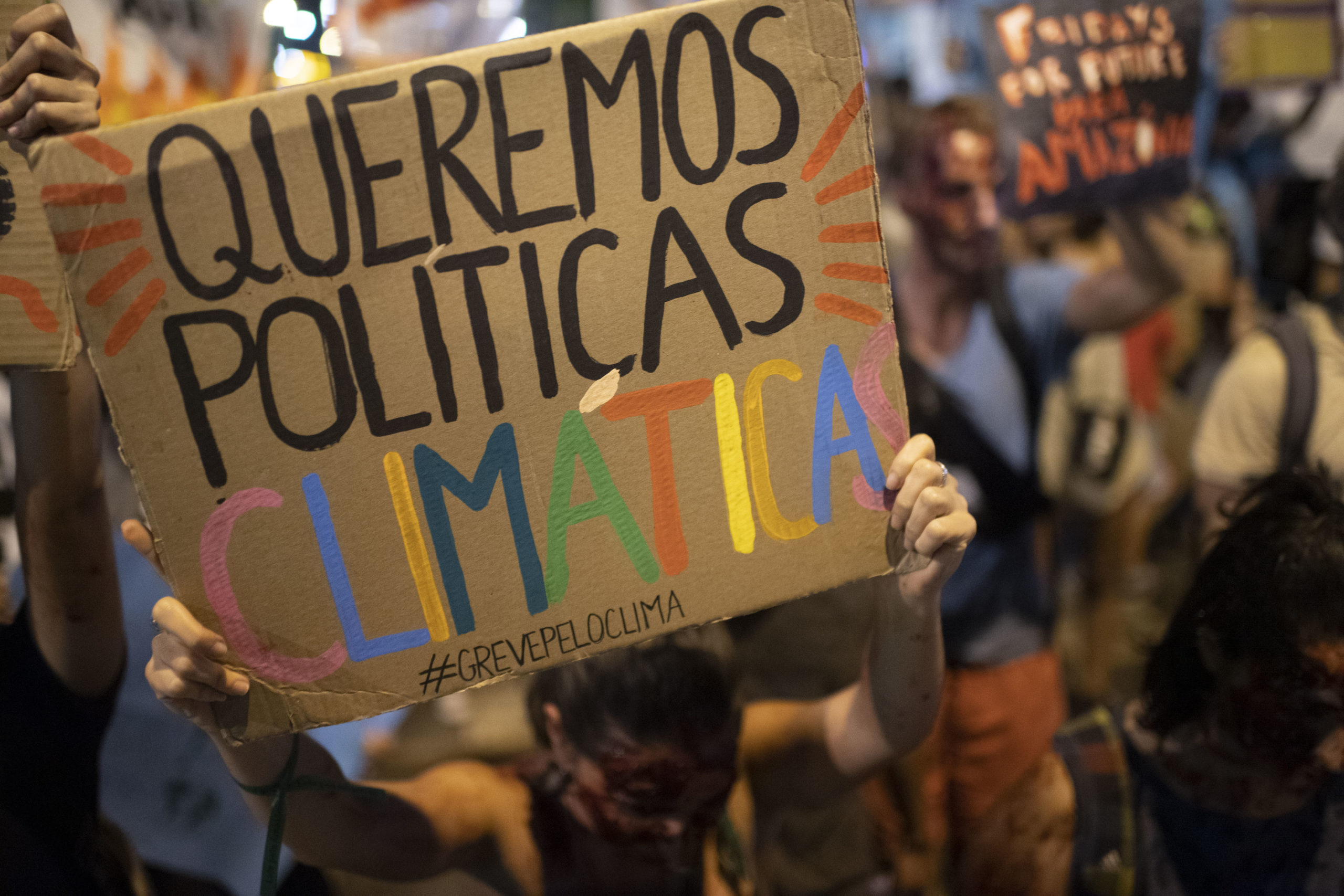How the justice system can be engaged to tackle the climate crisis
In a book, experts explain how climate litigation can be an innovative tool to help combat the climate crisis, racism and other inequalities
 Foto: Mauro Pimentel/AFP
Foto: Mauro Pimentel/AFP
In a historic case, in March 2022, 13 directors of the oil company Shell were prosecuted for not preparing the company to achieve “net zero” – i.e. eliminating all emissions of greenhouse gases – and thereby failing to align the company’s operations with the goals of the Paris Agreement. According to the environmental law organization ClientEarth, which filed the lawsuit in a British court, the company’s plan is neither consistent nor specific enough, and the directors need to be held personally accountable.
Although it is only recently that the Paris Agreement is being used to establish an obligation to reduce a company’s emissions, one advocacy and regulatory tool is increasingly gaining relevance: human rights-based climate litigation, that is, accountability for governments and companies for actions that lead to an increase in global warming through the use of human rights mechanisms and norms.
According to a study by the Grantham Research Institute, of the London School of Economics, the first such examples occurred in the United States in the 1980s. By 2021, there had already been 1,904 climate litigation cases in 39 countries, involving 13 international and regional courts or tribunals. But this number is growing. While before 2014 an average of one hundred such cases were registered per year worldwide, in 2020 alone the number was 180. Of the total cases mapped, 58% were climate litigation.
Read more
“As this ‘human rights turn’ in climate litigation has taken hold, the actors that implemented it, supported it or encouraged it multiplied quickly. These include domestic and international environmental and human rights organizations, climate and social justice movements, UN special rapporteurs, indigenous organizations, public prosecutors and governmental and intergovernmental human rights bodies,” wrote César Rodríguez-Garavito, professor of the NYU School of Law and Chair of the Center for Human Rights and Global Justice, and organizer of the book “Litigating the Climate Emergency: citizen mobilization in the courts to tackle the environmental crisis and assure basic rights”. “Definitely, the time of human rights-based climate litigation has begun.”
Climate litigation in Brazil
In the book, Júlia Neiva, coordinator of the Defense of Socioenvironmental Rights program at Conectas, and the lawyer Gabriel Mantelli, advisor for the same program at Conectas, wrote an article discussing the Brazilian approach to climate litigation, highlighting the context of democratic setbacks under the Bolsonaro government and reflecting on the experiences of a civil society organization in combating these setbacks.
As Neiva pointed out at the event to launch the book, components of rights, environmental racism, climate racism and social inequalities have long guided the legal actions of organizations such as Conectas.
Climate Fund
One example was the decision taken as part of ADPF (Allegation of Violation of a Fundamental Precept) Case No. 708, filed in 2020 by political parties with the support of civil society organizations, including Conectas, which was an amicus curiae in the case. By 10 votes to 1, the Supreme Court ordered the federal government to reinstate funding for the National Fund on Climate Change, better known as the Climate Fund, which has existed since 2009 and is one of the country’s main bodies in the fight against the climate crisis. The decision was celebrated worldwide, not only due to the importance of the precedent, but also because it indicated, for the first time, that the Paris Agreement is a human rights treaty.
“When we say that climate is inseparable from human rights, we are asking: who is impacted by these terrible storms that devastate our country? Who has suffered from the terrible droughts in northeastern Brazil?” said Neiva, at the event to launch the book.
“First of all, these disasters are not just caused by nature, they involve the action of human beings. Second, the impacts are different. This is what we bring to the discussion on human rights. We are saying that everyone will suffer the impacts of climate change, but these impacts will be felt differently, and we need public policies and the judiciary to take notice of this in their responses,” said the coordinator, explaining that, in addition to the State, the private sector also bears responsibility for climate and human rights violations in Brazil.
Case demands commitment from BNDESPar to climate targets
Another example in Brazil of the climate litigation movement is the public civil action filed by Conectas with the Federal Courts of the Federal District that calls on the BNDESPar – the subsidiary of the BNDES (Brazilian Development Bank) responsible for managing the shareholder interests in companies held by the bank – to publish a plan to reduce greenhouse gas emissions that will guide its investments according to the targets of the Paris Agreement and the PNMC (National Policy on Climate Change). This is the first civil action on climate, within the scope of climate litigation, against a national development bank anywhere in the world.
According to Neiva, the case is intended to promote a debate on the need for state-owned companies to incorporate the climate crisis as a key part of their investment plans and, at the same time, to operate with transparency and in accordance with social and environmental responsibility criteria.
The book was published in Portuguese in Brazil by FGV Editora, with the support of the NYU School of Law, and it is also available in English from Cambridge University Press and in Spanish from Siglo XXI.






